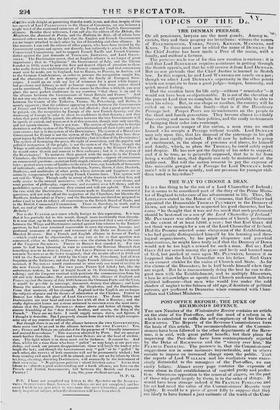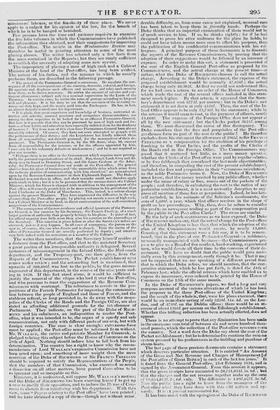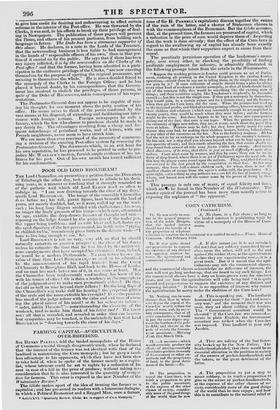POST-OFFICE REFORM; THE DUKE OF RICHMOND'S DEFENCE.
THE new Number of the Westminster Review contains an article on the state of the Post-office, and the need of a reform in it, which is calculated to ruffle the self-complacency of his Grace of RictimoNn. The Reports of the Revenue Commissioners form the basis of this article. The recommendations of the Commis- sioners have been followed in the other departments of the Reve- nue, it is said, with great public benefit; but their plans for improving the Post-office have been contemptuously rejected by the Duke of Ricrimolsin and the "viceroy over him," Sir FRANCIS FREELING. The preteme is, that the Commissioners' suggestions are in some instances impracticable, and in others certain to impose an increased charge upon the public. That, the reports of Lord WALLACE and his coadjutors were exces• sively distasteful to the managers of the Post-office, we can easily believe. Almost every page contains the exposure of some abuse in that establishment of vaunted purity and perfec- tion. Strenuous opposition to the removal of abuses, on the part of those who profit largely by them, is in the order of things. It his set had rated the value of the Commissioners' Reports very I are likely to have formed a just estimate of the worth of the Com- Missioners' labours. or the fea.sibtoty of their plans. We never apply to a culprit for his opitdon of the law, for tl.e breach of which he is to be banged or banished.
Few persons have the time and patience requisite to examine the five folio volumes in width the Commissioners have published the information they obtained, and their suggestions for improving the Post-Office. The article in the Westminster Review may therefore be useful in pointing attention to some of the most glarieg abuses. The writer has selected only a few facts from the mass contained in the Reports; but they are amply sufficient to establish the necessity of adopting some new sys'em.
The impropriety of placing a man of high rank and a Cabitiet Minister at the head of the Post-offiee, has long been evident. The nature of his duties, and the manner in which he usually perfurtns them, are described in the following passage.
" The power of the Postmaster-General i enornmus. He regulates the eon- veyance of ail the correspondence Of the country, domestic, colonial, awl foreign. He appoints and displaces such officers and servants, and takes such security
from them, as he deems necessary. He settles the amount of salaries and con- tingent allowances; subject only m a nominal supervision by the Lords of the Treasury. In certain cases, he settles the rates of postage according to his good will and pleasure. It is his duty to see that the accounts of the acsruing re- venue are duly kept, and the money paid into the Exchequer. Ile has, in fact, an almost &mitotic control over bk department. " It is plain, that great exiwrience and knowledge of business, unwearied at- tention and activity, unusual precision and scrupulous disintetestedness, are among the first requisites to he looked for in an efficient Postmaster-General.
But how is it possible that they can be possessed by men of high rank and for- tune--whose habits and education have especially unfitted them Mr the drudgery of busiress ? Yet from teen of this class have Postmasters-General been almost
invariably selected. Of course, they have not even attempted to grapple with the pertermance of their ditties ; and the Legislature has kindly relieved them
from all responsibility, not directly personal, for the management of their de- partment. The Postmaster-General is, by the 9th Anne, chap. 10, exempt from all responsibility for the revenue, or for the officers appointed by him, ' save only for his voluntary defaults or misfeasances ;' and he is not required to give any security. "Perhaps there is no office in the Government which requires more peremp- torily the personal superintendence of its ebief. But, though Lords Grey and Al- thorp may he found in Downing Street, and Sir James Graham at the Admi- ralty, the Postmaster-General does not reside at the Post-office. His general abserce from his place of businessomd the unavoidable delay which arises from the ordinary practice of communicating with him elsewhere,' are animadverted upon by the Revenue Commissioners in their Eighteenth Report. The Duke of Richmond was not then in office, and their remarks could not therefore apply
particularly to hint ; but it is to be presumed that the onerous duties of a Cabinet Minister, which his Grace is charged with in addition to the management of the Post. ■Sfire, will scarcely permit him to be more assiduous in his ,attendance than Lord Chichester or the Duke of Manchester. This, indeed, is a serious charge against the present Ministers. They have augmented the difficuties in the way of controlling the Post-office people, by placing not merely a man of high rank, but a Cabinet Minister at its head, in direct contravention of the well-considered suggestions of the Commissioners.
" The consequence of the non-residence and official ignorance of the Postmas- ter- General, is the exercise by his Secretary, Sir Francis Freeling, of a touch
larger portion of authority than properly belongs to his place. In point of fact, his official superior does little more than give his sanction to the proceedings of the Secretary. This sanction is given before or after the Secrete y's orders are
executed, just as it may happen. In all cases of emergency, the person on the spot is, of ceurse, the one who directs and is obeyed. Thus the duties of the office of Postmaster- General arc actually rtfitrmed by deputy ; and interfere very little indeed with his avocations as a member of the Cabinet."
The writer then mentions, that the Secretary himself resides at a distance from the Post.office, and that to the assistant Secretary a great portion of his irresponsible authority is delegated. Several instances of mismanagement in the Inland Office, the Mail-coach department, and the Twopenny-post, are then given, from the Reports of the Commissioners. The Packet establishment next comes under review ; and the astounding fact is mentioned, that upwards of 300,000/. was lost to the public, by the gross misma- nagement of this department, in the course of the nine years end- ing in 1830. If this fact stood alone, it would be sufficient to justify the removal of the clique who lord it over the Post-office, and who presume to treat the suggestions of the Revenue Com- missioners with contempt. The reluctance to accede to the pro- positions of the French Postmaster for improving the communica- tion between the people of England and those of Frarce, and the stubborn refusal, so long persisted in, to do away with the mono- polies of the Clerks of the Roads and the Foreign 011:ce, are also
stated as affording additional grounds for the interference of Parliament. They indicate, on the part of the Duke of RICH- MOND and his subalterns, an indisposition to render the Post- office, what it was intended to be, the organ of a speedy and safe communication, not only with different parts of our own, but with foreign countries. The case is clear enough: extraneous force must be applied; the Post-office must be reformed from without. Mr. WALLACE, the active and patriotic Member for Greened:, is pledged to bring this subject before the House of Commons on the 29th of April. Nothing should induce hint to fall back from his determination. The country has a right to know why the recom- mendations of Lord WALLACE'S expensive Commission have not beep acted upon; and something of more weight than the mere assertion of the Duke of RICHMOND or Sir FRANCIS FREELING should be required to satisfy the Representatives of the People, that the members of that Commission, who exercised so sound a discretion on all other matters, have proved themselves to be so ignorant and so incapable on this. Ministers, it is understood, will oppose Mr. WALL CE's motion; and the Duke of RICHMOND has been exerting himse f to get up a case to justify their opposition, and to induce the Ilsuse of Corn- 1110/1S to abstain from interfering with his department. With this View, sonie "Papers relating to the Post office" have Leen printed ; . and we have obtained a copy of them—though not without consi, derable difficulty, as, from some cause not explained, unusual care has been taken to keep them in friendly hands. Perhaps the
Duke thinks that an impartial examination of them would not be of much service to him. If so, he thinks rightly ; for if be had designed to prove his utter unfitness for the place he holds, he could not have taken means more sure to effect his purpose, than the publication of his confidential communications with his col- leagues. A principal purpose of these documents is to discredit the rerorts of the Revenue Commissioners, by proving that She
adoption of their suggestions.would be followed by an increase of expense. In order to make this out, a statement is presented of the cost of the English General Post-office as proposed by the Commissioners, and the actual charge at the present time—or rather, what the Duke of RICHMOND chooses to call the actual charge. Aceording to the Duke's statement, the expense of the proposed establishment would be annually 47,850/4 the actual charge being only 40,302/. At first we could not understand this; for we had seen a return to an order of the House of Commons, which made the cost of the several offices included in this state- ment much higher. By that retm in it appeared that the Secre- tary's department cost 8773/. per annum; but in the Duke's nes statement it is set down at only 4530/. Then, the cost of the In- land Office appears to be only 13,740/. by the statement; while b5. the returns it would seem to cost, in the payment. of officers, nearly 19,000/. The expense of the Foreign Office does not appear at all by the new statement ; but the Clerks pocket 3621/. among them. We soon discovered the cause of this discrepancy. The Duke considers that the fees and perquisites of the Posnollice gentlemen form no part of the cost to the public I He therefore excludes from his statement the allowance of 2965/. to Sir FRANCiS FREELING as a compensation for the abolition of his privilege of franking to the West Indies, and the profits of the Clerks of the Roads and in the Foreign Office. The Commissioners sup- posed that it mattered but little, as a mere money question whether the Clerks of the Post-offce were paid by regular salaries, or by fees (although they considered the last mode objectionable), and therefore, in computing the cost of the present establishment, included the fees and perquisites in their " erroneous calculation," as the noble Postmaster terms it. Now, the Duke of Ricniaorsts must know, that the money received by any public officer, whether under the name of salary or fees, conies out of the pockets of the people; and therefore, in calculating the cost to the nation of any particular establishment, it is a most unworthy deception to sup- press all mention of those fees or perquisites. Indeed, he has him- self included. in his estimate of the Solicitor's emoluments, the sum of 1,400/. a year, which that officer receives in the shape et: profit on law proceedings. Why, then, does he refuse to consider the profits on newspaper trading as part of the compensation paid by the public to the Post-office Clerks? The cases are similar.
By the help of such contrivances as we bare exposed, the Duke of RICHMOND makes out, that the actual charge for the Post-offiees of the United kingdom is less than that which the adoption of the plan of the Commissioners would create, by nearly 13,000L Granting that this statement were a fair one, it is to be remem- bered, that in the place of one P.stmaster-General—a noblemaro neeessat fly unacquainted with be siness—the Commissioners pro- pore to give us a Board of five resident, hard-working, experienced men, who would devote all their time to the concerns of their de- partment. We have no doubt that the public would gain mate- rially even by this arrangement, costly though it be. That it may not be supposed that we ate speaking of a different period from: that to which the Duke refers, we should mention, that the com- parative statement, which he has put forth, is dated the 24th of February last; while the official returns which have enabled us os expose its inaccuracy, were ordered to be printed by the House of Commons on the 13th of the same month.
In the Duke of RICHMOND'S papers, we find a loug and very pompous account of the various alterations of which he has bees
tlte proposer in the three Post-offices of the United Kingdoms;
and the result of the whole is, that, were his plans executed, there would be an immediate saving of' only 5258/. 15s. 4d. on the Lon- don, and of 4799/. on the Dublin offices; there would be an in- crease of about 1300/. per annum on the Edinburgh establishmest. Whether this trifling reduction has been actually effected, does not appear.
There is no attempt to prove that any diminution has been made in the enormous sum total of between six and seven hundred thou- sand pounds, which the collection of the Post-office revenues costs the count] y. Not a word does the Duke say about the cost of the Packet establishment ; but he is determined to continue the ruinous system pursued by his predecessors in the building and purchase of steam-boats.
The last page of these precious documents contains a statement which deserves particular attention. It is entitled "An Aceonnt of the Gross and Net Revenue and Charges of Management [of the Post-office of Great Britain) in each of the last ten years: It is dated from the General Post-office, 21st February 1834, and is signed by the Accountant-General. From this account it appears, that the grcss receipts have amounted lo 20,751,041/. 5s. 8d.; but that the charges and the net revenue together make up the sum
Of 19,65.1,01-1/. 2v. ad. only. The difference is 1,097,627/. 38.8d- Now the puldic has a right to know from the managers of tins Post-office what they have done with this teld million and up- wards. It is t present unaccounted for.
It has Leon usual with the apologists of the Duke of Riespeosa to give him credit for desiring and endeavouring to effect certain reforms in the interior of the Post-office. He was thwarted by the
Clerks, it was said, in his efforts to break up their privilege of deal- ing in Newspapers. The publication of these papers will prevent the Times, and others of his present partisans, from holding such language in future. The Duke has been a strenuous supporter of this abuse. He declares, in a note to the Lords of the Treasury, that the newsvending business is less liable to bad management in the lands of" responsible officers of his own," than in that por- tion of it carried on by the public. He says that if there has been any injury inflicted, it is by the newsvenders on the Clerks of the Pos1.4ice l and that the former, having been admitted to a parti-
cipation in the exclusive privilege of thClerks, "are now exerting themselves for the purpose of ejecting the original possessors, and securing to themselves the whole." He is also a decided friend to the monopoly of the Clerks in the Foreign Office; and he has placed it beyond doubt, by his correspondence, that the Govern-
ment has resolved to abolish the privileges of those persons, in spite of the Duke of RicIlsloNn,notin consequence of his repre- sentations.
The Postmaster-General does not appear to be capable of rais- ing his thoughts for one moment above the petty routine of his office. Ile seems never to think of the power conferred. by the vast means at his disposal, of extending and facilitating our inter- course with foreign nations. Foreign newspapers he calls a luxury, which the few who choose to purchase should be made to pay dearly for. The advantages resulting from a cheap and fre- quent interchange of periodical works, and of letters, with our French neighbours, never seem to have struck him.
We are more than ever convinced of the necessity of commenc- ing a revision of the existing Post-office system by removing the Postmaster-General. The documents which, in an evil hour for his own reputation, be has procured to be printed in order to pre- judice Mr. WALLACE'S motion, furnish ample evidence of his un- fitness for his post. Out of his own mouth has issued sufficient for his condemnation.




















 Previous page
Previous page